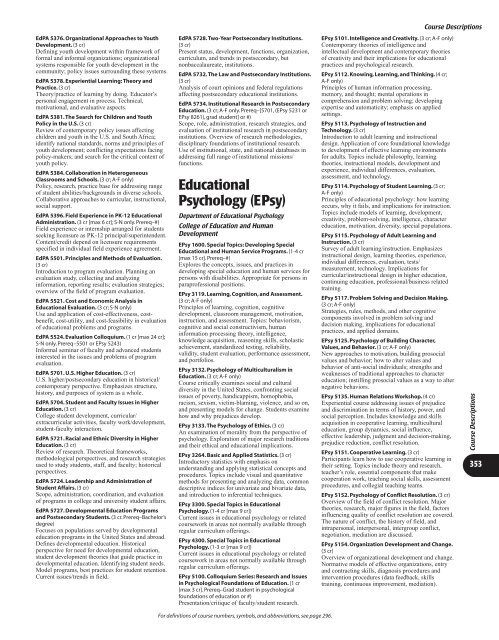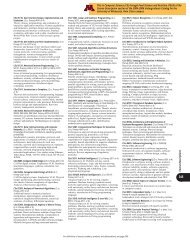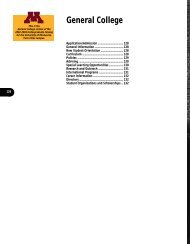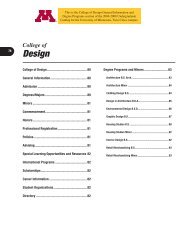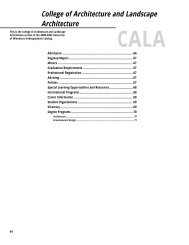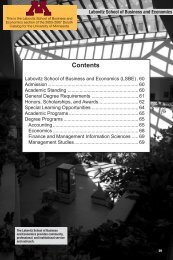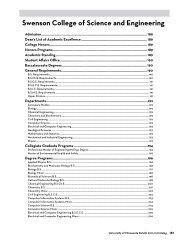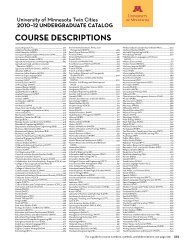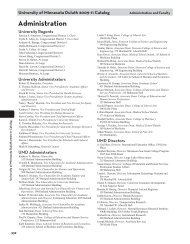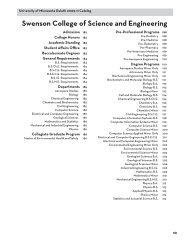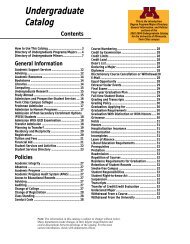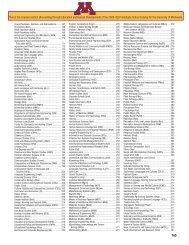EdPA 5376. Organizational Approaches to YouthDevelopment. (3 cr)Defining youth development within framework offormal <strong>and</strong> informal organizations; organizationalsystems responsible for youth development in thecommunity; policy issues surrounding these systems.EdPA 5378. Experiential Learning: Theory <strong>and</strong>Practice. (3 cr)Theory/practice of learning by doing. Educator’spersonal engagement in process. Technical,motivational, <strong>and</strong> evaluative aspects.EdPA 5381. The Search for Children <strong>and</strong> YouthPolicy in the U.S. (3 cr)Review of contemporary policy issues affectingchildren <strong>and</strong> youth in the U.S. <strong>and</strong> South Africa;identify national st<strong>and</strong>ards, norms <strong>and</strong> principles ofyouth development; conflicting expectations facingpolicy-makers; <strong>and</strong> search for the critical content ofyouth policy.EdPA 5384. Collaboration in HeterogeneousClassrooms <strong>and</strong> Schools. (3 cr; A-F only)Policy, research, practice base for addressing rangeof student abilities/backgrounds in diverse schools.Collaborative approaches to curricular, instructional,social support.EdPA 5396. Field Experience in PK-12 EducationalAdministration. (3 cr [max 6 cr]; S-N only. Prereq–#)Field experience or internship arranged for studentsseeking licensure as PK-12 principal/superintendent.Content/credit depend on licensure requirementsspecified in individual field experience agreement.EdPA 5501. Principles <strong>and</strong> Methods of Evaluation.(3 cr)Introduction to program evaluation. Planning anevaluation study, collecting <strong>and</strong> analyzinginformation, reporting results; evaluation strategies;overview of the field of program evaluation.EdPA 5521. Cost <strong>and</strong> Economic Analysis inEducational Evaluation. (3 cr; S-N only)Use <strong>and</strong> application of cost-effectiveness, costbenefit,cost-utility, <strong>and</strong> cost-feasibility in evaluationof educational problems <strong>and</strong> programs.EdPA 5524. Evaluation Colloquium. (1 cr [max 24 cr];S-N only. Prereq–5501 or EPsy 5243)Informal seminar of faculty <strong>and</strong> advanced studentsinterested in the issues <strong>and</strong> problems of programevaluation.EdPA 5701. U.S. Higher Education. (3 cr)U.S. higher/postsecondary education in historical/contemporary perspective. Emphasizes structure,history, <strong>and</strong> purposes of system as a whole.EdPA 5704. Student <strong>and</strong> Faculty Issues in HigherEducation. (3 cr)College student development, curricular/extracurricular activities, faculty work/development,student-faculty interaction.EdPA 5721. Racial <strong>and</strong> Ethnic Diversity in HigherEducation. (3 cr)Review of research. Theoretical frameworks,methodological perspectives, <strong>and</strong> research strategiesused to study students, staff, <strong>and</strong> faculty; historicalperspectives.EdPA 5724. Leadership <strong>and</strong> Administration ofStudent Affairs. (3 cr)Scope, administration, coordination, <strong>and</strong> evaluationof programs in college <strong>and</strong> university student affairs.EdPA 5727. Developmental Education Programs<strong>and</strong> Postsecondary Students. (3 cr. Prereq–Bachelor’sdegree)Focuses on populations served by developmentaleducation programs in the United States <strong>and</strong> abroad.Defines developmental education. Historicalperspective for need for developmental education,student development theories that guide practice indevelopmental education. Identifying student needs.Model programs, best practices for student retention.Current issues/trends in field.EdPA 5728. Two-Year Postsecondary Institutions.(3 cr)Present status, development, functions, organization,curriculum, <strong>and</strong> trends in postsecondary, butnonbaccalaureate, institutions.EdPA 5732. The Law <strong>and</strong> Postsecondary Institutions.(3 cr)Analysis of court opinions <strong>and</strong> federal regulationsaffecting postsecondary educational institutions.EdPA 5734. Institutional Research in PostsecondaryEducation. (3 cr; A-F only. Prereq–[5701, (EPsy 5231 orEPsy 8261), grad student] or #)Scope, role, administration, research strategies, <strong>and</strong>evaluation of institutional research in postsecondaryinstitutions. Overview of research methodologies,disciplinary foundations of institutional research.Use of institutional, state, <strong>and</strong> national databases inaddressing full range of institutional missions/functions.EducationalPsychology (EPsy)Department of Educational PsychologyCollege of Education <strong>and</strong> HumanDevelopmentEPsy 1600. Special Topics: Developing SpecialEducational <strong>and</strong> Human Service Programs. (1-4 cr[max 15 cr]. Prereq–#)Explores the concepts, issues, <strong>and</strong> practices indeveloping special education <strong>and</strong> human services forpersons with disabilities. Appropriate for persons inparaprofessional positions.EPsy 3119. Learning, Cognition, <strong>and</strong> Assessment.(3 cr; A-F only)Principles of learning, cognition, cognitivedevelopment, classroom management, motivation,instruction, <strong>and</strong> assessment. Topics: behaviorism,cognitive <strong>and</strong> social constructivism, humaninformation processing theory, intelligence,knowledge acquisition, reasoning skills, scholasticachievement, st<strong>and</strong>ardized testing, reliability,validity, student evaluation, performance assessment,<strong>and</strong> portfolios.EPsy 3132. Psychology of Multiculturalism inEducation. (3 cr; A-F only)Course critically examines social <strong>and</strong> culturaldiversity in the United States, confronting socialissues of poverty, h<strong>and</strong>icappism, homophobia,racism, sexism, victim-blaming, violence, <strong>and</strong> so on,<strong>and</strong> presenting models for change. Students examinehow <strong>and</strong> why prejudices develop.EPsy 3133. The Psychology of Ethics. (3 cr)An examination of morality from the perspective ofpsychology. Exploration of major research traditions<strong>and</strong> their ethical <strong>and</strong> educational implications.EPsy 3264. Basic <strong>and</strong> Applied Statistics. (3 cr)Introductory statistics with emphasis onunderst<strong>and</strong>ing <strong>and</strong> applying statistical concepts <strong>and</strong>procedures. Topics include visual <strong>and</strong> quantitativemethods for presenting <strong>and</strong> analyzing data, commondescriptive indices for univariate <strong>and</strong> bivariate data,<strong>and</strong> introduction to inferential techniques.EPsy 3300. Special Topics in EducationalPsychology. (1-4 cr [max 9 cr])Current issues in educational psychology or related<strong>course</strong>work in areas not normally available <strong>through</strong>regular curriculum offerings.EPsy 4300. Special Topics in EducationalPsychology. (1-3 cr [max 9 cr])Current issues in educational psychology or related<strong>course</strong>work in areas not normally available <strong>through</strong>regular curriculum offerings.EPsy 5100. Colloquium Series: Research <strong>and</strong> Issuesin Psychological Foundations of Education. (1 cr[max 3 cr]. Prereq–Grad student in psychologicalfoundations of education or #)Presentation/critique of faculty/student research.Course DescriptionsEPsy 5101. Intelligence <strong>and</strong> Creativity. (3 cr; A-F only)Contemporary theories of intelligence <strong>and</strong>intellectual development <strong>and</strong> contemporary theoriesof creativity <strong>and</strong> their implications for educationalpractices <strong>and</strong> psychological research.EPsy 5112. Knowing, Learning, <strong>and</strong> Thinking. (4 cr;A-F only)Principles of human information processing,memory, <strong>and</strong> thought; mental operations incomprehension <strong>and</strong> problem solving; developingexpertise <strong>and</strong> automaticity; emphasis on appliedsettings.EPsy 5113. Psychology of Instruction <strong>and</strong>Technology. (3 cr)Introduction to adult learning <strong>and</strong> instructionaldesign. Application of core foundational knowledgeto development of effective learning environmentsfor adults. Topics include philosophy, learningtheories, instructional models, development <strong>and</strong>experience, individual differences, evaluation,assessment, <strong>and</strong> technology.EPsy 5114. Psychology of Student Learning. (3 cr;A-F only)Principles of educational psychology: how learningoccurs, why it fails, <strong>and</strong> implications for instruction.Topics include models of learning, development,creativity, problem-solving, intelligence, charactereducation, motivation, diversity, special populations.EPsy 5115. Psychology of Adult Learning <strong>and</strong>Instruction. (3 cr)Survey of adult learning/instruction. Emphasizesinstructional design, learning theories, experience,individual differences, evaluation, tests/measurement, technology. Implications forcurricular/instructional design in higher education,continuing education, professional/business relatedtraining.EPsy 5117. Problem Solving <strong>and</strong> Decision Making.(3 cr; A-F only)Strategies, rules, methods, <strong>and</strong> other cognitivecomponents involved in problem solving <strong>and</strong>decision making, implications for educationalpractices, <strong>and</strong> applied domains.EPsy 5125. Psychology of Building Character,Values, <strong>and</strong> Behavior. (3 cr; A-F only)New approaches to motivation, building prosocialvalues <strong>and</strong> behavior; how to alter values <strong>and</strong>behavior of anti-social individuals; strengths <strong>and</strong>weaknesses of traditional approaches to charactereducation; instilling prosocial values as a way to alternegative behaviors.EPsy 5135. Human Relations Workshop. (4 cr)Experiential <strong>course</strong> addressing issues of prejudice<strong>and</strong> discrimination in terms of history, power, <strong>and</strong>social perception. Includes knowledge <strong>and</strong> skillsacquisition in cooperative learning, multiculturaleducation, group dynamics, social influence,effective leadership, judgment <strong>and</strong> decision-making,prejudice reduction, conflict resolution.EPsy 5151. Cooperative Learning. (3 cr)Participants learn how to use cooperative learning intheir setting. Topics include theory <strong>and</strong> research,teacher’s role, essential components that makecooperation work, teaching social skills, assessmentprocedures, <strong>and</strong> collegial teaching teams.EPsy 5152. Psychology of Conflict Resolution. (3 cr)Overview of the field of conflict resolution. Majortheories, research, major figures in the field, factorsinfluencing quality of conflict resolution are covered.The nature of conflict, the history of field, <strong>and</strong>intrapersonal, interpersonal, intergroup conflict,negotiation, mediation are discussed.EPsy 5154. Organization Development <strong>and</strong> Change.(3 cr)Overview of organizational development <strong>and</strong> change.Normative models of effective organizations, entry<strong>and</strong> contracting skills, diagnosis procedures <strong>and</strong>intervention procedures (data feedback, skillstraining, continuous improvement, mediation).Course Descriptions353For definitions of <strong>course</strong> <strong>numbers</strong>, <strong>symbols</strong>, <strong>and</strong> abbreviations, see page 296.
354EPsy 5155. Group Dynamics <strong>and</strong> Social Influence.(3 cr)Overview of the field of group dynamics withemphasis on social influence. Major theories,research, <strong>and</strong> figures in the field are covered. Groupgoals, communication, leadership, decision making,problem solving, conflicts, power, uniqueness theory,deindividuation, <strong>and</strong> minority influence will becovered.EPsy 5156. Social <strong>and</strong> Personality Influences onEducation. (4 cr; A-F only)Survey of social psychology <strong>and</strong> personality appliedto education. Application of major theories <strong>and</strong>research to classroom <strong>and</strong> school practices <strong>and</strong>educational issues are emphasized. Class sessionsinclude lectures, discussions, simulations,experiential exercises. Intrapersonal, interpersonal,<strong>and</strong> group dynamics are discussed.EPsy 5157. Social Psychology of Education. (3 cr;A-F only)Overview of social psychology <strong>and</strong> its application toeducation. Participants study the major theories,research, <strong>and</strong> major figures in field. Class sessionsinclude lectures, discussions, simulations, role-plays,<strong>and</strong> experiential exercises.EPsy 5191. Education of the Gifted <strong>and</strong> Talented.(3 cr; A-F only)Theories of giftedness, talent development,instructional strategies, diversity <strong>and</strong> technologicalissues, implications for educational practices <strong>and</strong>psychological inquiry, <strong>and</strong> internationalconsiderations.EPsy 5200. Special Topics: PsychologicalFoundations. (1-4 cr [max 30 cr])Focus on special topics in psychological <strong>and</strong>methodological concepts relevant to advancededucational theory, research, <strong>and</strong> practice notcovered in other <strong>course</strong>s.EPsy 5216. Introduction to Research in EducationalPsychology. (3 cr; A-F only. Prereq–5261 or other introstatistics <strong>course</strong>)Introduction to educational research, leading students<strong>through</strong> the basic steps involved in designing <strong>and</strong>conducting a research study. Topics includereviewing literature, formulating research problem,using different approaches to gather data, managing<strong>and</strong> analyzing data, <strong>and</strong> reporting results.EPsy 5221. Principles of Educational <strong>and</strong>Psychological Measurement. (4 cr. Prereq–5261 orequiv)Concepts, principles, <strong>and</strong> methods in educational/psychological measurement. Reliability, validity,item analysis, scores, score reports (e.g., grades).Modern measurement theories, including itemresponse theory <strong>and</strong> generalizability theory.Emphasizes construction, interpretation, use, <strong>and</strong>evaluation of assessments regarding achievement,aptitude, interests, attitudes, personality, <strong>and</strong>exceptionality.EPsy 5222. Measurement <strong>and</strong> Analysis: K-12Education Accountability. (4 cr. Prereq–5231 or [5221,5261] or [Psy 3305, Psy 5862] or #)Methods of educational accountability. Meaning ofstudent/school accountability. Measurement ofeducational inputs, processes, <strong>and</strong> results. Dataanalysis, data use for school improvement.EPsy 5231. Introductory Statistics <strong>and</strong>Measurement in Education. (4 cr. §5261, §5263)Students develop an underst<strong>and</strong>ing of basic statistics<strong>and</strong> measurement concepts <strong>and</strong> tools <strong>and</strong> apply themto the collection, analysis, <strong>and</strong> interpretation of data.EPsy 5243. Principles <strong>and</strong> Methods of Evaluation.(3 cr)Introductory <strong>course</strong> in program evaluation; planningan evaluation study, collecting <strong>and</strong> analyzinginformation, reporting results; overview of the fieldof program evaluation.EPsy 5244. Survey Design, Sampling, <strong>and</strong>Implementation. (3 cr. Prereq–[5221 or 5231 or 5261or equiv], [CEHD grad student or MEd student])Survey methods, including mail, phone, <strong>and</strong> Webbased/emailsurveys. Principles of measurement,constructing questions <strong>and</strong> forms, pilot testing,sampling, data analysis, <strong>and</strong> reporting. Studentsdevelop a survey proposal <strong>and</strong> a draft survey, pilotthe survey, <strong>and</strong> develop sampling/data analysis plans.EPsy 5246. Evaluation Colloquium: PsychologicalFoundations. (1 cr [max 8 cr]; S-N only. Prereq–5243/EdPA 5501)Informal seminar of faculty <strong>and</strong> advanced studentsinterested in the issues <strong>and</strong> problems of programevaluation.EPsy 5261. Introductory Statistical Methods. (3 cr.§5231, §5263)Application of statistical concepts/procedures.Graphs, numerical summaries. Normal distribution,correlation/regression analyses, probability,statistical inferences for one or two samples.Hypothesis tests, Chi-square tests. Conceptualunderst<strong>and</strong>ing/application of statistics.EPsy 5262. Intermediate Statistical Methods. (3 cr.Prereq–5261 or equiv)Application of statistical concepts/procedures.Analysis of variance, covariance, multiple regression.Experimental design: completely r<strong>and</strong>omized, block,split plot/repeated measures.EPsy 5263. Statistics for Preprofessional Students.(3 cr. §5231, §5261)Descriptive statistics for continuous variables, simpleregression <strong>and</strong> correlation, inferences on means,introduction to analysis of variance <strong>and</strong> multipleregression, contingency tables, <strong>and</strong> computeranalysis techniques.EPsy 5271. Becoming a Teacher of Statistics. (3 cr.Prereq–5261 or equiv)Current methods of teaching first <strong>course</strong>s instatistics. Innovative teaching methods, materials,<strong>and</strong> technological tools. Types of first <strong>course</strong>s,reform recommendations, goals for student learning,recommended content, teaching methods,technology, student assessment.EPsy 5281. Introduction to Computer Operations<strong>and</strong> Data Analysis in Education <strong>and</strong> Related Fields.(3 cr; S-N only)Introductory computer literacy <strong>course</strong> to familiarizestudents with personal computers <strong>and</strong> computingresources at the University. Applications includeelectronic communications, spreadsheets, graphicalpresentation, <strong>and</strong> data analysis.EPsy 5300. Special Topics in EducationalPsychology. (1-9 cr [max 9 cr])Current issues in educational psychology or relatedareas not normally available <strong>through</strong> regularcurriculum offerings.EPsy 5400. Special Topics in Counseling Psychology.(1-4 cr [max 8 cr])Theory, research, <strong>and</strong> practice in counseling <strong>and</strong>student personnel psychology. Topics vary.EPsy 5401. Counseling Procedures. (3 cr.Prereq–Upper div student)Emphasis on the counseling relationship <strong>and</strong>principles of interviewing. Case studies, role playing,<strong>and</strong> demonstration. For individuals whoseprofessional work includes counseling <strong>and</strong>interviewing.EPsy 5412. Introduction to DevelopmentalCounseling <strong>and</strong> Guidance. (3 cr. Prereq–#)Contemporary models of counselors as advocates forall students. Emphasizes prevention <strong>and</strong> systemsintervention with counselors involved in thedevelopmental guidance curriculum, school change,staff <strong>and</strong> community collaboration, individualstudent planning, <strong>and</strong> learning success with diversepopulations.EPsy 5421. Leadership <strong>and</strong> Administration ofStudent Affairs. (3 cr; A-F only)Theoretical approaches, administrative structure, <strong>and</strong>evaluation methods used in college/university studentaffairs.EPsy 5422. Principles of Group Work: Theory <strong>and</strong>Procedures. (3 cr. Prereq–Advanced undergrad or gradstudent in the helping professions)Principles <strong>and</strong> practices of group work for educators<strong>and</strong> the helping professions. Discussion of varioustypes of groups (e.g., counseling support, task,psychoeducational). Applications to various settings<strong>and</strong> populations (e.g., schools <strong>and</strong> communityagencies).EPsy 5432. Foundations of Individual/Organizational Career Development. (3 cr; A-F only)Introduction to individual <strong>and</strong> organizational careerdevelopment theory <strong>and</strong> practice. Examines criticalissues in work patterns, work values, <strong>and</strong> workplacesin a changing global society, with implications forcareer planning, development, <strong>and</strong> transitions,emphasizing personal <strong>and</strong> organizational change. Fornonmajors: serves students in adult ed, HRD, IR,college student advising, <strong>and</strong> other related fields.EPsy 5433. Counseling Women Over the Life Span.(3 cr. Prereq–Counseling or career development<strong>course</strong>)Counseling skills <strong>and</strong> interventions to facilitatecareer development of girls <strong>and</strong> women of differentlife stages <strong>and</strong> backgrounds (school girls to olderwomen); developmental issues from a systematicintegrative life planning framework; facts, myths,<strong>and</strong> trends regarding women’s changing roles.EPsy 5434. Counseling Adults in Transition. (3 cr.Prereq–Advanced undergrad or grad student in thehelping professions)Psychological, physical, <strong>and</strong> social dimensions ofadult transitions (e.g., family <strong>and</strong> personalrelationships, career). Adult development theories,stress <strong>and</strong> coping, <strong>and</strong> helping skills <strong>and</strong> strategies asthey relate to adult transition.EPsy 5451. The College Student. (3 cr)The psychology <strong>and</strong> sociology of college students,including research concerning diversity ofpopulations, vocational development of students,student society, culture, mental health,underachievement, dropouts, values <strong>and</strong> attitudes,<strong>and</strong> relevant research methods.EPsy 5461. Cross-Cultural Counseling. (2 cr; A-F only)Emphasis on the effect of cross-cultural <strong>and</strong> crossnationalpsychological differences in human traits<strong>and</strong> characteristics. These theoretical differencesprovide a framework for the development <strong>and</strong>implementation of effective cross-cultural counselinginterventions.EPsy 5601. Survey of Special Education. (2 cr)Introduction to programs <strong>and</strong> services provided topeople with disabilities in school <strong>and</strong> communitysettings. Emphasis on the needs of families, to theroles <strong>and</strong> responsibilities of teachers, <strong>and</strong> to relatedservice providers.EPsy 5602. Computer Technology in SpecialEducation. (2 cr; A-F only)Develop skills, underst<strong>and</strong> processes, <strong>and</strong> identifyresources needed to utilize technology to benefitpersons with disabilities. Emphasis on learningtheory, principles of effective instruction,instructional <strong>and</strong> assistive technology integration.EPsy 5603. Childhood Language Development:Classroom Implications. (3 cr)Recent trends <strong>and</strong> findings in the study of languageacquisition <strong>and</strong> communication; classroomimplications, including education of exceptionalchildren <strong>and</strong> implications of diversity on instruction.EPsy 5604. Transition from School to Work <strong>and</strong>Community Living for Persons With Special Needs.(2 cr)Design of training programs to promote independentliving. Vocational <strong>and</strong> community adjustment forpersons with disabilities <strong>and</strong> who are at-risk.Curriculum materials, methods, <strong>and</strong> organizationalstrategies for adolescents <strong>and</strong> adults, families, <strong>and</strong>community service providers.EPsy 5609. Family-Centered Services. (2 cr; A-F only)Methods for collaborating with families in theeducation of children with disabilities. Focus onfamily-centered approach to design of educationalplans <strong>and</strong> procedures. Specific emphasis onmulticultural perspectives of family life <strong>and</strong>expectations for children.


